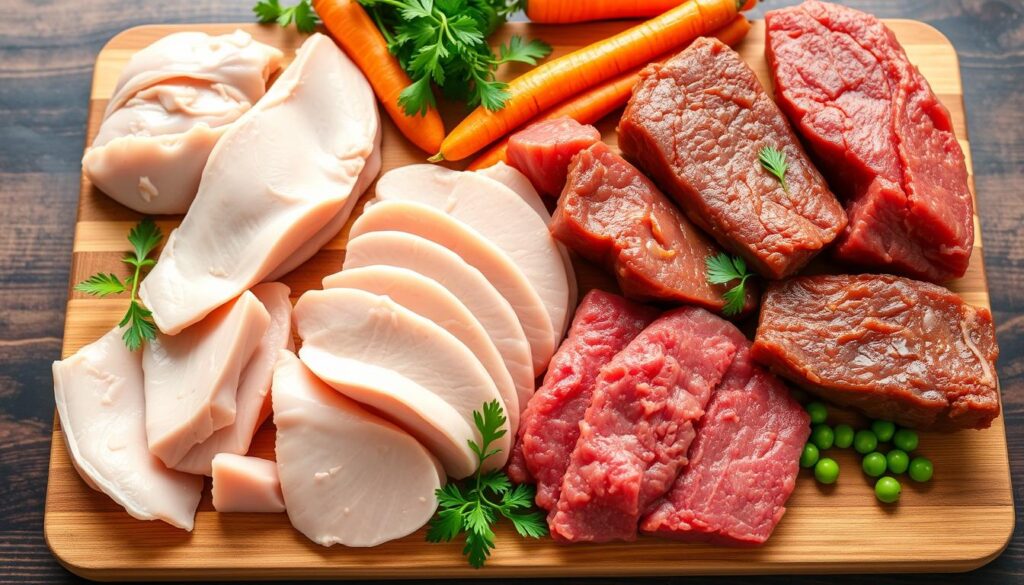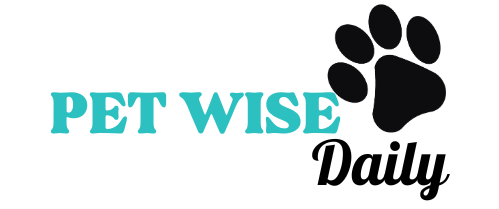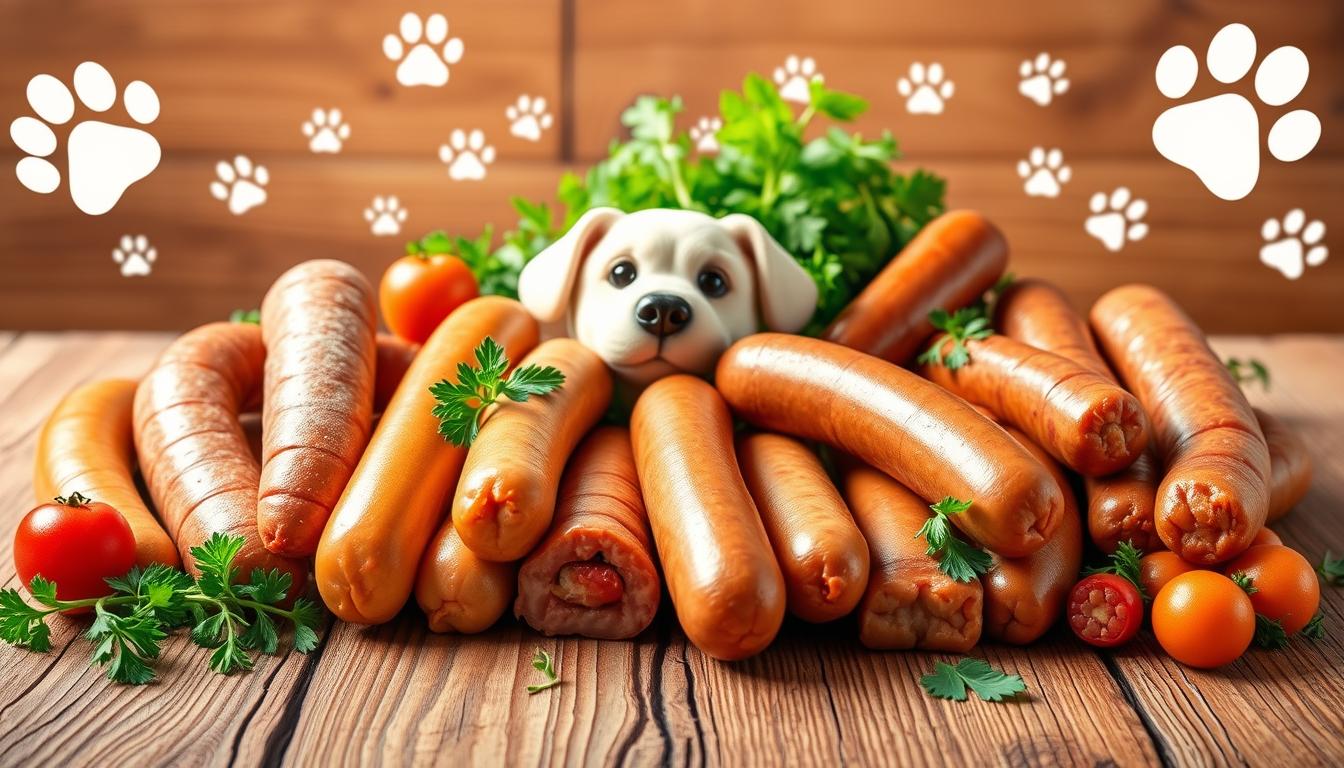As a devoted dog parent, I know the temptation to share our favorite human treats with our canine companions. But when it comes to sausage, it’s important to resist that urge. Most kinds of sausage are not safe for dogs to eat. In this guide, we’ll explore the risks, guidelines, and healthy alternatives to ensure your furry friend’s well-being.
Sausage, a beloved staple in many households, is often high in fat and sodium. These nutrients can be harmful to a dog’s health. Sausage also contains seasonings and additives like garlic, onion, and spices. These can be toxic and even life-threatening for our canine companions.
As responsible pet owners, it’s crucial to understand the importance of a balanced diet for our dogs. Treats, like sausage, should make up no more than 10% of a dog’s overall caloric intake. Exceeding this can lead to weight gain, digestive issues, and other health problems. Instead, we should focus on providing our furry friends with lean protein options, such as plain chicken or turkey. We should also give them healthy, dog-safe vegetables like carrots or green beans.
Table of Contents
Understanding Sausage and Dog Nutrition
As pet owners, knowing what our dogs need is key. Dogs eat meat but also some plants. The best food for them is a high-quality dog food that fits their age and health.
But sausages are a different story. They are not good for dogs.
Basic Canine Dietary Requirements
Dogs need a lot of protein, fats, carbs, vitamins, and minerals. These keep them healthy. Their needs change with age, how active they are, and any health issues.
Nutritional Content of Sausage
Sausages are full of fat and sodium. They don’t offer much good for dogs. They also have additives that can harm a dog’s health.
The Role of Processed Meats in Dog Diet
Processed meats like sausages are bad for dogs. They have too much fat and harmful additives. Treats, including sausages, should only be 10% of a dog’s diet. This keeps their diet balanced and healthy.
Can Dogs Have Sausage: Safety Guidelines and Risks
Dogs can have a little bit of plain, cooked sausage sometimes. But, it’s not a good idea because of the health risks. Sausages have a lot of fat and salt. They also might have garlic and onion, which are bad for dogs.
To keep your pet safe, don’t give them sausage. Choose better, healthier meat that’s made just for dogs. Let’s look at the rules and dangers of giving sausage to your furry friend.
Risks of Feeding Sausage to Dogs
- Sausages are high in fat, which can lead to pancreatitis, a potentially life-threatening condition in dogs.
- The high sodium content in sausages can cause dehydration and electrolyte imbalances.
- Seasonings and additives, such as garlic and onion, can be toxic to dogs and cause gastrointestinal issues.
- Raw sausage meat may contain harmful bacteria and parasites that can make your dog sick.
- Processed meats like sausage do not provide sufficient nutritional value for a dog’s diet, which should be primarily composed of high-quality, dog-friendly proteins and nutrients.
Remember, sausages are not good for your dog. To keep them healthy, don’t give them sausage. Choose safer, better food instead.
Feeding Sausage Safely
If you still want to give your dog sausage, follow these rules:
- Choose plain, cooked sausage without any seasonings, spices, or preservatives.
- Cut the sausage into small pieces to avoid choking.
- Only give a small amount, no more than 10% of their daily calories.
- Watch your dog for any signs of upset stomach or bad reactions.
Remember, sausage should be a rare treat, not a regular food. Make sure your dog eats a balanced, high-quality diet that fits their needs.
Health Risks Associated with Feeding Sausage to Dogs
Feeding sausage to dogs can be tempting, but it’s risky. The fat in sausage can cause pancreatitis, a serious condition. Sausage also has a lot of sodium, which can lead to dehydration and other health problems.
High Fat Content and Pancreatitis
Sausages have a lot of fat, which is bad for dogs. Eating too much fat can lead to pancreatitis. This is a painful condition that can be life-threatening if not treated.
It’s important to keep dogs away from sausage to avoid pancreatitis.
Sodium Levels and Dehydration
Sausages have a lot of sodium, which can cause dehydration in dogs. Too much sodium can upset the body’s fluid balance. This can lead to increased thirst, frequent urination, and other health issues.
Dehydration is especially dangerous for dogs, especially in hot weather. It’s best to limit their sausage and high-sodium food intake.
Harmful Seasonings and Additives
Many sausages have seasonings and additives that are toxic to dogs. Ingredients like garlic, onion, and preservatives can harm their health. These can cause stomach problems, damage to red blood cells, and other issues.
It’s important to avoid giving dogs sausage with these harmful ingredients.
In summary, sausage is not good for dogs. It can cause pancreatitis, dehydration, and harm from toxic ingredients. Pet owners should be careful and not give sausage to their dogs. This is to keep their canine health and pet nutrition in check.
Different Types of Sausages and Their Effects on Dogs
Feeding your dog is important, and knowing the risks of sausages is key. Sausages might seem like a fun treat, but they can harm your dog’s health.
Some sausages, like bratwurst, hot dogs, and chorizo, are bad for dogs. They have too much fat, sodium, and spices. These can cause pancreatitis and dehydration.
Chicken sausage might seem safer, but it’s still too salty for dogs. Liver sausage and vegan sausages can also upset a dog’s stomach.
Sausages can also make dogs sick with foodborne illnesses. Never give raw sausage to dogs. It can cause trichinosis and other harmful diseases.
It’s safer to give your dog dog-safe meat treats instead of sausages. This keeps them healthy and happy.
Knowing the dangers of sausages helps keep your dog safe. Always think about your pet’s health when choosing their food.
Signs of Sausage-Related Health Issues in Dogs
Feeding sausage to your dog can be risky. It’s important to know the signs that show your dog might have eaten sausage. Spotting these symptoms early can help prevent bigger problems.
Immediate Reactions to Watch For
Watch for signs of distress if your dog eats sausage. Look for vomiting, diarrhea, lethargy, and loss of appetite. They might also show signs of stomach pain or bloating. These signs are the body’s way of trying to get rid of the bad stuff in sausage.
Long-term Health Concerns
Feeding sausage regularly can cause serious health problems. It can lead to obesity, pancreatitis, and sodium ion poisoning. Dogs might also develop allergies or intolerances to processed meats. This can cause skin problems or ongoing digestive issues.
| Condition | Symptoms | Potential Causes |
|---|---|---|
| Pancreatitis | Abdominal pain, vomiting, diarrhea, loss of appetite | High-fat diet, including sausage |
| Sodium Ion Poisoning | Excessive thirst, lethargy, vomiting, seizures | Excessive sodium intake from sausage |
| Food Allergies or Intolerances | Skin irritation, digestive issues, ear infections | Sensitivity to processed meats in sausage |
Knowing the risks and watching your dog’s health closely is key. If you see any worrying signs, get help from your vet right away.
Safe Alternatives to Sausage for Dogs
Sausage might look tasty to your dog, but it’s not good for them. It has too much fat, sodium, and bad stuff. Luckily, there are better choices that are safe and tasty for your dog.
Plain, cooked chicken or turkey without skin and bones is great. These lean meats are full of protein and low in fat. Dogs love them. Cooked veggies like carrots or green beans are also good. They’re crunchy and healthy.
- Plain, cooked chicken or turkey (without skin and bones)
- Cooked vegetables (e.g., carrots, green beans)
- Specially made dog treats
- Small amounts of plain, cooked lean meats (e.g., beef, lamb)
There are dog treats made to taste like sausage but are safe. These treats are made with your dog’s health in mind. Just remember, treats should not be more than 10% of your dog’s daily food.
Offering small amounts of plain, cooked lean meats as treats is okay. But do it in small amounts. Always think about your dog’s health when choosing their food.

Proper Portion Control and Feeding Guidelines
Feeding your dog the right amount of treats is key. Sausage treats should be given based on your dog’s size, breed, and health. Treats should not make up more than 10% of your dog’s daily calories.
Size-based Serving Recommendations
Small dogs need only a tiny bit of sausage, if any. Larger dogs might get a bit more. But, it’s safer to choose healthier foods for your dog’s diet.
Frequency of Treats in Dog Diet
Give treats like sausage sparingly. They should not be a regular part of your dog’s meals. Too many high-fat, high-sodium treats can cause health problems. Always check with your vet to make sure you’re feeding your dog right.
| Dog Size | Recommended Sausage Serving |
|---|---|
| Small Dogs (up to 20 lbs) | 1-2 bite-sized pieces |
| Medium Dogs (21-50 lbs) | 1-2 thin slices |
| Large Dogs (51 lbs and up) | 1-2 small, thin pieces |
The best choice is to avoid sausage and give your dog nutritious, vet-approved treats. These support their health and well-being.
Emergency Response: What to Do If Your Dog Eats Sausage
As a pet owner, worrying about your dog eating something harmful is normal. Sausage can be a concern. It’s important to act fast and know what to do.
If your dog eats a small amount of plain, cooked sausage, watch for signs of trouble. Look for vomiting, diarrhea, tiredness, or belly pain. These could mean your dog needs vet help.
But, if your dog eats a lot of sausage or it has garlic, onions, or too much seasoning, call your vet right away. These can harm your pet, causing pancreatitis, dehydration, or organ damage.
If you think your dog ate sausage, don’t wait for symptoms. Your vet might tell you to make your dog vomit or give other treatments. This can keep your dog safe.
Being quick to react is key to keeping your pet safe. Knowing the risks and what to do can prevent emergencies. This way, you can keep your furry friend healthy and happy.
Safe and Healthy Meat Options for Dogs
Choosing the right meats is key for your dog’s health. Sausages are tempting but can be risky due to fat, sodium, and additives. Luckily, there are many safe and healthy meat options for your dog.
Plain, cooked chicken is a top choice for dogs. It’s lean and easy to digest. Turkey is also good, being low in fat and rich in nutrients. Beef and lamb are okay too, but make sure they’re cooked well and without extra fats or seasonings.
Fish like sardines, tuna, or salmon are great for dogs sometimes. They add omega-3 fatty acids, which are good for skin and coat health.
- Plain, cooked chicken
- Turkey
- Beef
- Lamb
- Sardines, tuna, or salmon (canned in water)
When preparing these meats, remove bones, skin, and excess fat. These can be harmful to your dog. Also, consider high-quality commercial dog foods for a balanced diet.
Introduce new foods slowly to prevent upset stomachs. By choosing these safe meats, you ensure your dog gets the nutrients they need without the risks of sausages and processed meats.

| Meat Option | Nutritional Benefits | Precautions |
|---|---|---|
| Chicken | Lean protein, easily digestible | Remove bones, skin, and excess fat |
| Turkey | Low in fat, high in nutrients | Cook thoroughly, avoid seasoning |
| Beef | Excellent source of protein | Cook well, remove excess fat |
| Lamb | Rich in essential amino acids | Avoid potential allergens, cook thoroughly |
| Fish (sardines, tuna, salmon) | High in omega-3 fatty acids | Choose canned in water, not oil |
Conclusion
It might be tempting to give sausage to your dog, but it’s not safe. Sausage has too much fat and salt. It also has harmful additives and seasonings.
These can cause serious problems like pancreatitis and dehydration. Even worse, they can be toxic to dogs.
Instead, give your dog a balanced diet of good dog food and safe treats. Choose plain, lean meats like chicken or turkey. Look for healthier treats that taste like sausage but are safe for dogs.
By choosing wisely, you can keep your dog healthy and happy for a long time.
Always talk to your vet before changing your dog’s diet. They can help you make the best choices for your pet’s health. With care and the right choices, you can keep your dog safe and happy.

